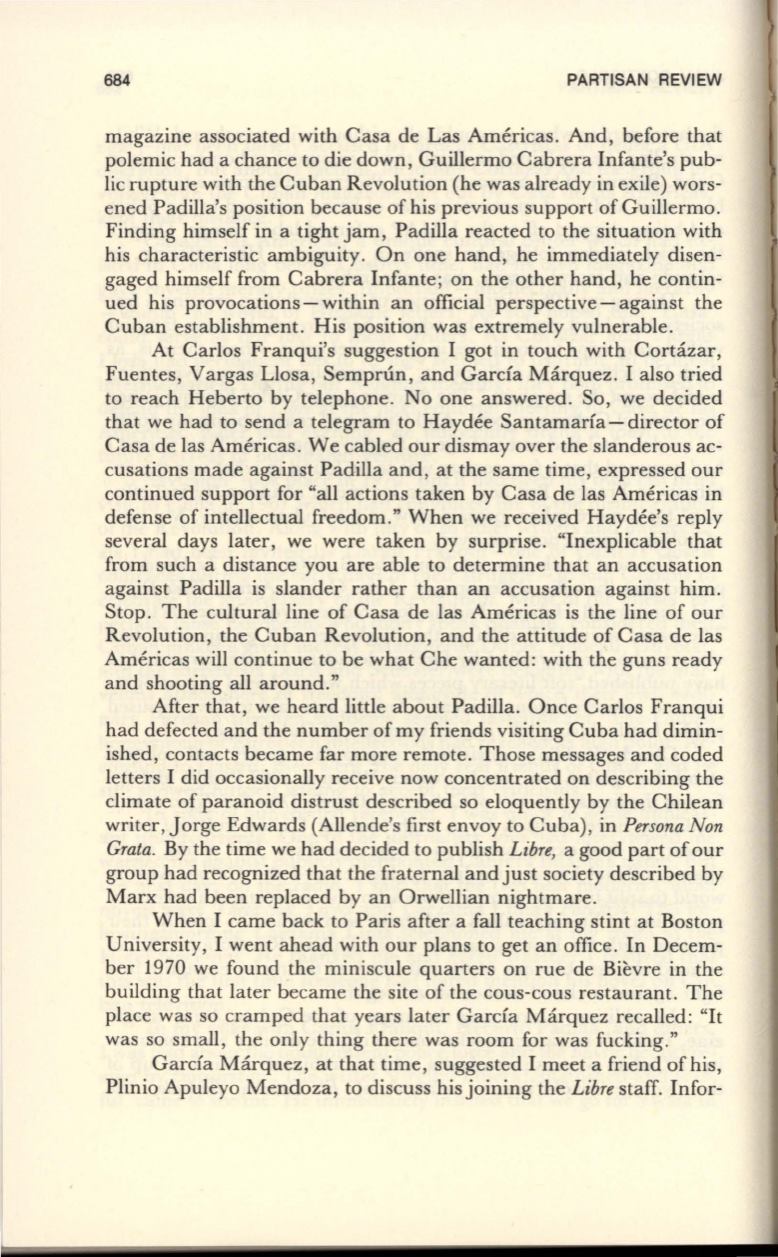
684
PARTISAN REVIEW
magazine associated with Casa de Las Americas . And, before that
polemic had a chance to die down, Guillermo Cabrera Infante's pub–
lic rupture with the Cuban Revolution (he was already in exile) wors–
ened Padilla's position because of his previous support of Guillermo.
Finding himself in a tight jam, Padilla reacted to the situation with
his characteristic ambiguity . On one hand, he immediately disen–
gaged himself from Cabrera Infante; on the other hand, he contin–
ued his provocations- within an official perspective- against the
Cuban establishment. His position was extremely vulnerable.
At Carlos Franqui's suggestion I got in touch with Cortazar,
Fuentes, Vargas Llosa, Semprun, and Garda Marquez. I also tried
to reach Heberto by telephone . No one answered. So, we decided
that we had to send a telegram to Haydee Santamaria- director of
Casa de las Americas . We cabled our dismay over the slanderous ac–
cusations made against Padilla and, at the same time, expressed our
continued support for "all actions taken by Casa de las Americas in
defense of intellectual freedom ." When we received Haydee's reply
several days later, we were taken by surprise. "Inexplicable that
from such a distance you are able to determine that an accusation
against Padilla is slander rather than an accusation against him.
Stop. The cultural line of Casa de las Americas is the line of our
Revolution, the Cuban Revolution, and the attitude of Casa de las
Americas will continue to be what Che wanted: with the guns ready
and shooting all around."
After that, we heard little about Padilla. Once Carlos Franqui
had defected and the number of my friends visiting Cuba had dimin–
ished, contacts became far more remote. Those messages and coded
letters I did occasionally receive now concentrated on describing the
climate of paranoid distrust described so eloquently by the Chilean
writer, Jorge Edwards (Allende's first envoy to Cuba), in
Persona Non
Grata.
By the time we had decided to publish
Libre,
a good part of our
group had recognized that the fraternal and just society described by
Marx had been replaced by an Orwellian nightmare .
When I came back to Paris after a fall teaching stint at Boston
University, I went ahead with our plans to get an office. In Decem–
ber 1970 we found the miniscule quarters on rue de Bievre in the
building that later became the site of the cous-cous restaurant. The
place was so cramped that years later Garda Marquez recalled: "It
was so small , the only thing there was room for was fucking ."
Garda Marquez, at that time, suggested I meet a friend of his ,
Plinio Apuleyo Mendoza, to discuss his joining the
Libre
staff. Infor-


